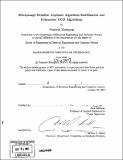| dc.contributor.advisor | Alan Edelman. | en_US |
| dc.contributor.author | Khungurn, Pramook | en_US |
| dc.contributor.other | Massachusetts Institute of Technology. Dept. of Electrical Engineering and Computer Science. | en_US |
| dc.date.accessioned | 2008-05-19T16:06:36Z | |
| dc.date.available | 2008-05-19T16:06:36Z | |
| dc.date.copyright | 2007 | en_US |
| dc.date.issued | 2007 | en_US |
| dc.identifier.uri | http://hdl.handle.net/1721.1/41662 | |
| dc.description | Thesis (M. Eng.)--Massachusetts Institute of Technology, Dept. of Electrical Engineering and Computer Science, 2007. | en_US |
| dc.description | Includes bibliographical references (p. 71-72). | en_US |
| dc.description.abstract | Shirayanagi and Sweedler [12] proved that a large class of algorithms on the reals can be modified slightly so that they also work correctly on floating-point numbers. Their main theorem states that, for each input, there exists a precision, called the minimum converging precision (MCP), at and beyond which the modified "stabilized" algorithm follows the same sequence of steps as the original "exact" algorithm. In this thesis, we study the MCP of two algorithms for finding the greatest common divisor of two univariate polynomials with real coefficients: the Euclidean algorithm, and an algorithm based on QR-factorization. We show that, if the coefficients of the input polynomials are allowed to be any computable numbers, then the MCPs of the two algorithms are not computable, implying that there are no "simple" bounding functions for the MCP of all pairs of real polynomials. For the Euclidean algorithm, we derive upper bounds on the MCP for pairs of polynomials whose coefficients are members of Z, 0, Z[6], and Q[6] where ( is a real algebraic integer. The bounds are quadratic in the degrees of the input polynomials or worse. For the QR-factorization algorithm, we derive a bound on the minimal precision at and beyond which the stabilized algorithm gives a polynomial with the same degree as that of the exact GCD, and another bound on the the minimal precision at and beyond which the algorithm gives a polynomial with the same support as that of the exact GCD. The bounds are linear in (1) the degree of the polynomial and (2) the sum of the logarithm of diagonal entries of matrix R in the QR factorization of the Sylvester matrix of the input polynomials. | en_US |
| dc.description.statementofresponsibility | by Pramook Khungurn. | en_US |
| dc.format.extent | 72 p. | en_US |
| dc.language.iso | eng | en_US |
| dc.publisher | Massachusetts Institute of Technology | en_US |
| dc.rights | M.I.T. theses are protected by
copyright. They may be viewed from this source for any purpose, but
reproduction or distribution in any format is prohibited without written
permission. See provided URL for inquiries about permission. | en_US |
| dc.rights.uri | http://dspace.mit.edu/handle/1721.1/7582 | en_US |
| dc.subject | Electrical Engineering and Computer Science. | en_US |
| dc.title | Shirayanagi-Sweedler algebraic algorithm stabilization and polynomial GCD algorithms | en_US |
| dc.type | Thesis | en_US |
| dc.description.degree | M.Eng. | en_US |
| dc.contributor.department | Massachusetts Institute of Technology. Department of Electrical Engineering and Computer Science | |
| dc.identifier.oclc | 219763137 | en_US |
